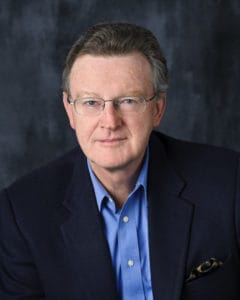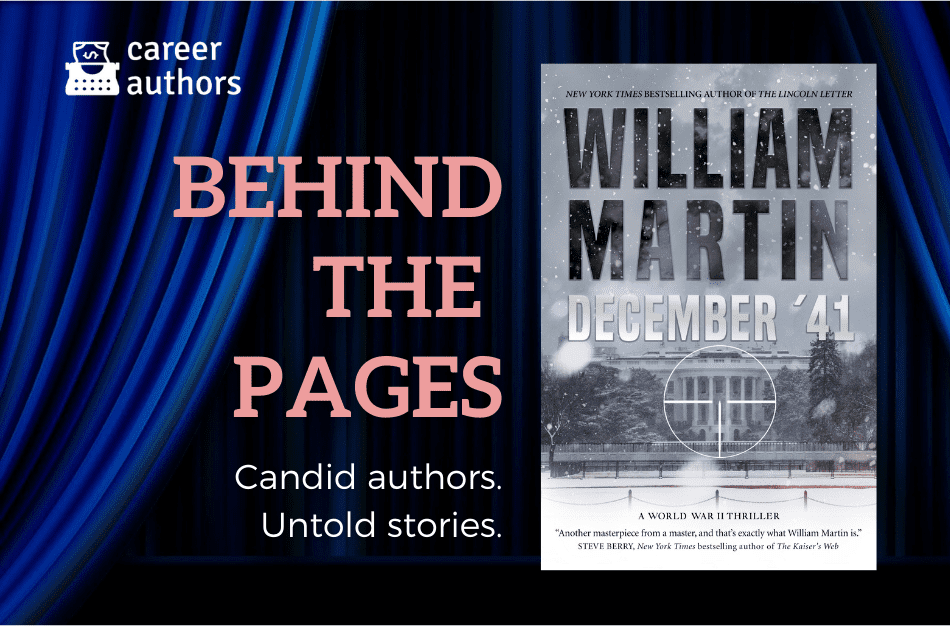No one makes history come more alive than New York Times bestselling author William Martin, whose one-of-a-kind thrillers have taken readers on wild rides through some of the most unsettling times in our nation–from the Pilgrims to the Civil War, the Gold Rush to 9/11, and now, to December ’41. Martin’s mulititudes of fans have been long been waiting for him to tackle WWII–and in his newest novel he delivers what Booklist calls “a devilishly complex and lusciously detail-rich thriller” that is sure to please his longtime readers and win him many more. In this exclusive BEHIND THE PAGES interview, Martin talks about how and why he came to write this riveting WWII pageturner.
1. What’s the title of your book—and was that always the title?
December ’41 is the title. Sometimes, a title precedes the book. Back Bay and Cape Cod are no-brainers. Sometimes, a publisher says, “No, the sales force can’t sell the book with this title. That’s how The Mother Lode became the much more kinetic Bound for Gold. And sometimes, you work without a title, just a generic placeholder like “WWII Thriller,” until you settle on something. In this case, I didn’t use Saving Roosevelt, one of my first possibilities. Too “on the nose.” I finally decided to invoke one of the most pivotal months in world history.
2. Who’s the main character of your book—and was that always their name?
He’s the anti-hero. His name is Martin Browning, born Martin Bruning in Koblenz, Germany, immigrated with his parents to Brooklyn, returned to study in Germany, recruited by Section 6, Reich Security Office. And no, he isn’t named “Martin” because I see myself in him. I gave him that name to suggest that he has the same kind of single-minded devotion to his cause that a certain 16th Century religious rebel brought to his. And “Browning” because he’s an expert in weapons, and he plans to use one to shoot Franklin Roosevelt.
3. At the start of the book, what’s the character’s goal?
His immediate goal: escape an FBI raid on December 8, 1941. His long term goal: kill Franklin Roosevelt on Christmas Eve, as he lights the National Christmas Tree. Those are still his goals at the end of the book.
4. What was the core idea for this novel—a plot point? a theme?—and where did it come from?
I was watching Darkest Hour, the story of Churchill in the spring of 1940. The British are huddled on the beach at Dunkirk. Churchill calls FDR to ask for help. France is falling to the Nazis. But FDR can offer nothing. His hands are tied by American politics. As we cut to a long shot of Churchill slumped and despairing in a dark corner of his underground headquarters, I remembered that Pearl Harbor would change everything. On December 22, 1941, Churchill would arrive in Washington. And on Christmas Eve, he and FDR would stand together, as allies, on the South Portico of the White House to light the National Christmas Tree. I thought, What a target! An assassin’s dream! And just like that, I had the plot hook. I just had to write it.
5. At what point did you come up with the final version of the first line?
It probably took me six drafts. I was shortening a much larger concept and hating to do it, but I knew I had to. I eventually condensed from eight pages down to one and a half. But that’s the process, right?
6. Did you know the ending of the book when you started?
I knew that the assassin would make it to Washington and set up the shot at the critical moment. The assassination thriller is a subgenre that may not have many rules, but that’s one of them. However, I didn’t have anything else. So I just wrote toward that moment. I call it signposting.
7. What’s something in this book that you’ve never done before?
I never before told a story that unfolds in just two and a half weeks. Usually I cover years, sometimes centuries.
8. What part of your tour (or launch week) are you most excited about?
I look forward to meeting lots of old (and some new) friends in the media, the bookselling business, and the reading public. To return to old bookselling haunts gives me a sense of continuity. I’m still doing it and still putting books into readers’ hands.
9. Who in your #writing community deserves a special shout-out for supporting you in writing this story?
Well, I tend to operate independently. Not even my wife reads the book until the first draft is done. But I would say that Thomas Cook’s very positive reaction when I told him the plot was important to me. My old friend Gary Goshgarian (aka Braver) is always a great springboard for ideas. Joe Finder and Hank Phillippi Ryan stepped up with very generous blurbs when I asked.
10. How do you want readers to feel when they close the book?
Breathless and hopeful. If ordinary Americans can do what the characters in this book do to stop what would have been one of the most earthshaking acts of the age, we can handle whatever history throws at us.
11. What did you learn from this book?
What I learn with every book I write: it never gets easier, but you may get better at it.
 William Martin is the New York Times bestselling author of twelve novels, a PBS documentary, book reviews, magazine articles, and a cult-classic horror movie, too. His first Peter Fallon novel, Back Bay, established him as “a master storyteller.” He has been following the lives of the great and anonymous in American history ever since, taking readers from the Mayflower in Cape Cod to Ford’s Theater in The Lincoln Letter to the South Tower on 9/11 in City of Dreams. Bound for Gold (2018), sweeps readers back to California in the legendary year of 1849 and “solidifies his claim as king of the historical thriller” (Providence Journal). And his latest, the “propulsive” December ’41, captures the atmosphere in the United States in the weeks after Pearl Harbor.
William Martin is the New York Times bestselling author of twelve novels, a PBS documentary, book reviews, magazine articles, and a cult-classic horror movie, too. His first Peter Fallon novel, Back Bay, established him as “a master storyteller.” He has been following the lives of the great and anonymous in American history ever since, taking readers from the Mayflower in Cape Cod to Ford’s Theater in The Lincoln Letter to the South Tower on 9/11 in City of Dreams. Bound for Gold (2018), sweeps readers back to California in the legendary year of 1849 and “solidifies his claim as king of the historical thriller” (Providence Journal). And his latest, the “propulsive” December ’41, captures the atmosphere in the United States in the weeks after Pearl Harbor.




